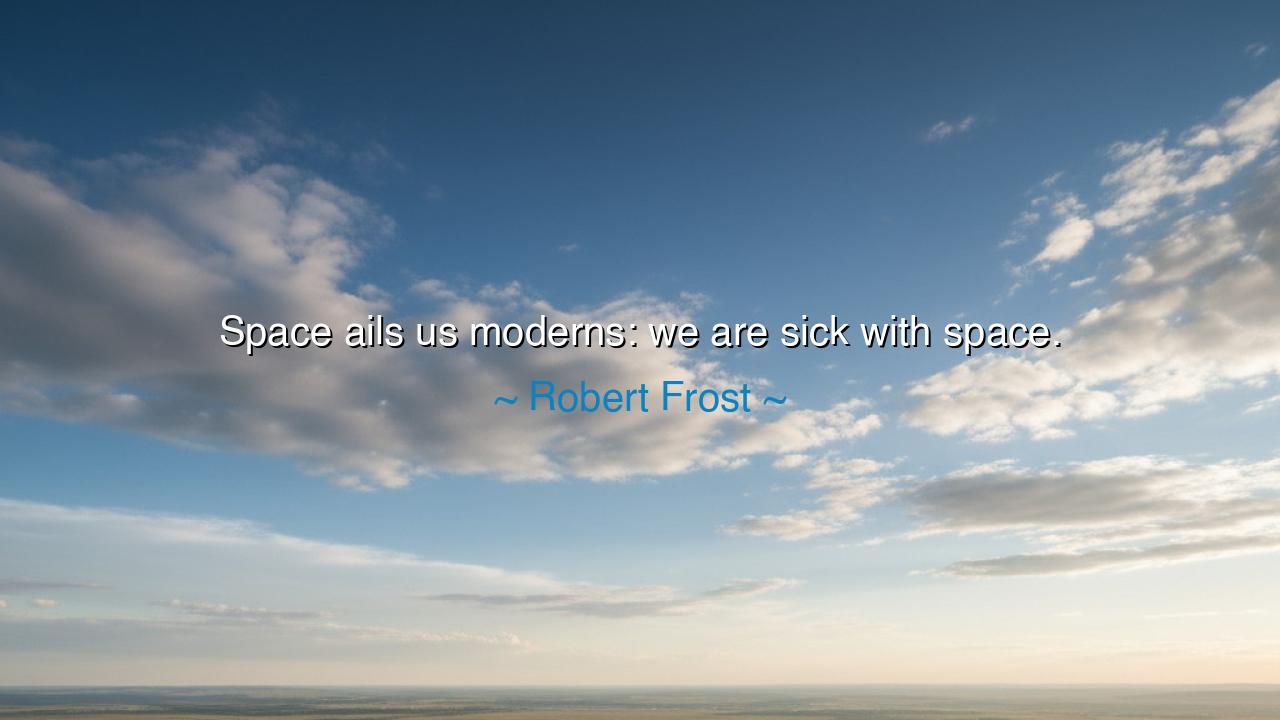
Space ails us moderns: we are sick with space.






In the heart of Robert Frost’s words lies a truth so profound it echoes through the very soul of modern life. “Space ails us moderns: we are sick with space,” he writes, and in these few words, he captures the affliction of a generation lost in the emptiness of its own creations. This is no trivial ailment; it is a sickness of the spirit, a plague that has settled in the hearts of those who have come to know both the vastness and the emptiness of the world they inhabit. Frost speaks not of the physical space around us, but of the mental and emotional space we have created—an overabundance of room, a silence so profound it drowns the very purpose of our lives.
Consider the age of the ancients—a time when men and women were bound to the rhythms of the earth, to the land and the sky, to the seasons and the natural cycles that governed their lives. Space, then, was not something that separated them; it was something that connected them to the world. Every element had its place—every step on the earth was taken with intention, and every breath in the air was filled with meaning. There was no empty space, no endless void in which the human soul could become lost. To be alive was to be deeply engaged with the world, not separated from it.
Yet, in the modern age, we are consumed by space. The very advancements that were meant to bring us closer together—machines, technology, and convenience—have, in their wake, left vast gaps in our lives. We can now communicate across continents in an instant, yet loneliness has become a plague. We can travel to the farthest reaches of the earth, yet still feel as though we are adrift in an endless sea of disconnection. We are, as Frost so poignantly notes, “sick with space,” a sickness borne from the paradox of being connected to everything, yet feeling disconnected from what truly matters. Our lives have become empty chambers, echoing with the sounds of our own isolation.
To understand the weight of Frost's words, we need not look far for examples. Henry David Thoreau, a man of great vision, understood the power of space as a force for both connection and separation. He withdrew from the hustle of society to live in the woods by Walden Pond, seeking to clear away the distractions of modern life. In his solitude, he found clarity. He created space—not for emptiness, but for reflection. In contrast, our modern world of endless information and endless options has become a great barrenness. We have built a world filled with artificial connections and digital distractions, yet we have lost the art of true reflection, true presence. We have too much space and yet too little substance.
Frost’s observation is not a call to isolate ourselves from the world, nor is it a condemnation of progress. It is, instead, a warning. A warning that the space we have created—both around us and within us—has the potential to become a breeding ground for restlessness and discontent. We must learn to fill that space not with noise, nor with the relentless pursuit of more, but with meaning. Space, when filled with purpose, becomes a powerful force—a space that allows for creativity, for growth, for true connection. But space, when allowed to fester with the emptiness of mindless pursuits, becomes a vast chasm, swallowing us whole.
Consider the story of Vincent van Gogh, whose life was marked by both profound loneliness and intense creativity. His work, born from the silence of his inner turmoil, was a way to fill the space within him. His isolation did not leave him empty; instead, he poured his very soul into the canvas, filling the spaces of his world with color and emotion. Yet, van Gogh also suffered from the very sickness that Frost warns of—a sickness of being lost in the vastness of his own mind, unable to connect with others. His space was both a canvas for creation and a prison that confined him to the depths of his own despair. His life shows us the delicate balance we must strike—how to make use of space, without allowing it to consume us.
So, what lesson can we draw from Frost’s words? It is this: we must fill our spaces with what is meaningful. We must not allow the vastness of the world, the emptiness of digital screens, or the overwhelming noise of modern life to define us. We must seek balance. Carve out time for reflection, for connection with others, for the creation of something that speaks to the heart. It is not the space itself that is the problem, but how we choose to fill it. We must learn to embrace the quiet, to make space for thoughts and dreams that arise from within, and to remember that it is in the filling of that space with purpose that we find true peace.
The modern world may be sick with space, but it is not beyond healing. The path forward is clear: to embrace the stillness with intention, to create spaces in our lives where meaning can flourish, and to remember that, just as we have built the world around us, so too can we reshape the space within. Only then will we be free from the sickness of space, and only then will we truly understand the purpose of our journey.






AAdministratorAdministrator
Welcome, honored guests. Please leave a comment, we will respond soon